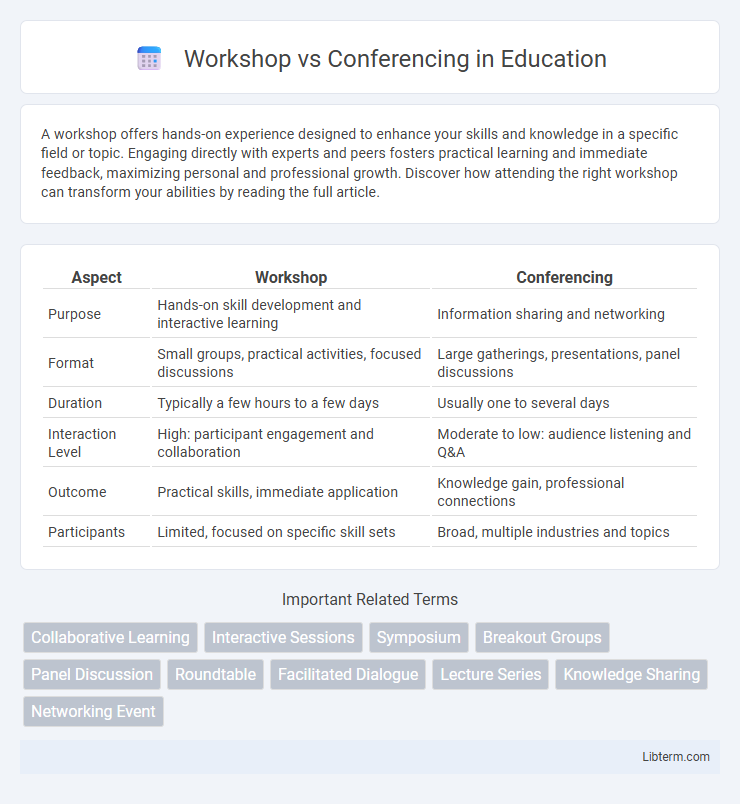A workshop offers hands-on experience designed to enhance your skills and knowledge in a specific field or topic. Engaging directly with experts and peers fosters practical learning and immediate feedback, maximizing personal and professional growth. Discover how attending the right workshop can transform your abilities by reading the full article.
Table of Comparison
| Aspect | Workshop | Conferencing |
|---|---|---|
| Purpose | Hands-on skill development and interactive learning | Information sharing and networking |
| Format | Small groups, practical activities, focused discussions | Large gatherings, presentations, panel discussions |
| Duration | Typically a few hours to a few days | Usually one to several days |
| Interaction Level | High: participant engagement and collaboration | Moderate to low: audience listening and Q&A |
| Outcome | Practical skills, immediate application | Knowledge gain, professional connections |
| Participants | Limited, focused on specific skill sets | Broad, multiple industries and topics |
Workshop vs Conferencing: Key Differences
Workshops emphasize hands-on, interactive learning with small groups focused on skill development, whereas conferencing typically involves larger audiences and centers on information exchange through presentations and discussions. Workshops foster direct participant engagement and practical application, while conferences prioritize networking opportunities and keynote speeches. The key differences lie in format, participant involvement, and educational objectives.
Understanding the Purpose: Workshop vs Conference
Workshops emphasize hands-on learning and skill development through interactive sessions, targeting specific practical outcomes for participants. Conferences concentrate on knowledge sharing, networking, and presenting new research or trends to a broader audience. Recognizing these distinct purposes helps organizers tailor content, format, and participant engagement strategies effectively.
Audience Engagement in Workshops and Conferences
Workshops foster higher audience engagement through interactive activities, hands-on exercises, and small group discussions, encouraging active participation and immediate application of skills. Conferences typically involve larger audiences with a focus on keynote speeches and panel discussions, resulting in less direct interaction but broader knowledge dissemination. Effective audience engagement in workshops is driven by personalized feedback and collaborative problem-solving, whereas conferences rely on dynamic presentations and networking opportunities.
Structure and Format Comparison
Workshops typically involve interactive, hands-on activities with smaller groups to foster skill development and active participation. Conferencing features larger audiences with a more formal structure, including presentations, keynote speeches, and panel discussions. Workshops prioritize engagement and collaboration, while conferencing emphasizes information dissemination and networking opportunities.
Learning Outcomes: Workshop vs Conference
Workshops typically provide interactive, hands-on learning experiences that enhance skill acquisition and practical knowledge application, resulting in higher retention rates. Conferences often focus on knowledge dissemination through presentations and keynote speeches, offering broader but less personalized learning outcomes. The immersive nature of workshops fosters deeper engagement and immediate feedback, whereas conferences facilitate networking and exposure to diverse ideas but may lack in-depth skill development.
Cost and Resource Considerations
Workshops generally incur higher costs due to smaller group sizes, interactive activities, and the need for specialized facilitators, while conferencing benefits from economies of scale with larger audiences and streamlined presentations. Resource allocation for workshops includes dedicated spaces, hands-on materials, and extended time commitments from participants and organizers. Conferencing requires investment in venue logistics, technology for presentations, and sometimes travel expenses, but spreads these costs over many attendees, making it resource-efficient for disseminating information broadly.
Choosing the Right Event for Your Goals
Workshops provide hands-on learning experiences that foster skill development and active participation, ideal for deepening expertise in a specific area. Conferencing offers networking opportunities, broad knowledge exchange, and exposure to diverse topics through presentations and panels, making it suitable for staying informed on industry trends. Selecting the right event depends on your goal: choose workshops to build practical skills and conferences to expand professional networks and gain comprehensive insights.
Ideal Topics for Workshops and Conferences
Workshops are ideal for hands-on, skill-building topics such as software training, leadership development, or design thinking, where interactive participation and practical exercises enhance learning outcomes. Conferences suit broader thematic discussions like industry trends, innovative research, or policy development, providing opportunities for keynote speeches, panel discussions, and extensive networking. Selecting the right format depends on whether the goal is in-depth skill acquisition or wide-ranging knowledge exchange among professionals.
Networking Opportunities: Conference or Workshop?
Workshops provide intimate networking opportunities through hands-on collaboration and small group discussions, fostering deeper connections and skill exchange among participants. Conferences offer broader networking scope with large-scale events, keynote speakers, and diverse attendees, enabling exposure to industry leaders and wider professional communities. Choosing between a workshop or conference depends on whether personalized interaction or extensive industry networking is the primary goal.
Maximizing Value from Workshops and Conferences
Workshops offer interactive, hands-on experiences that facilitate skill development and problem-solving through direct participant engagement, maximizing practical value. Conferences provide access to diverse expert insights, networking opportunities, and exposure to industry trends, enhancing strategic knowledge acquisition. Combining workshops' immersive learning with conferences' broad networking can optimize professional growth and maximize value realization.
Workshop Infographic

 libterm.com
libterm.com